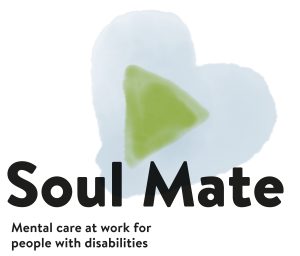Project title:
Soul Mate
Mental care at work for people with disabilities
Project period:
01.11.2022 – 31.10.2025
Supporter:
Erasmus+
KA220-ADU – Cooperation partnerships in adult education
Partner organisations:
KOPF, HAND und FUSS gemeinnützige Gesellschaft für Bildung mbH, GERMANY
People First Public Benefit Association, HUNGARY
SATIS, ITALY
Уърк Уит Ийз EOOD, BULGARIA
VSBI Verein zur sozialen und beruflichen Integration e.V., GERMANY
Project Summary in a Nutshell:
People with disabilities continue to be one of the most disadvantaged groups in terms of employment and mental health.
Soul Mate addresses both issues: it aims to improve the mental health of people with disabilities, thereby strengthening their work or entrepreneurial capacity.
WORK is the central engine of society; without it, we cannot fully participate in society. It is important that people with disabilities can also participate in the primary labor market in some form of employment (permanent work, remote work, temporary work, project participation). Work is fundamental for a self-determined life.
Why is mental support necessary in the workplace?
Because currently, it is one of the biggest challenges in every country. Stress, depression, and burnout are becoming increasingly significant problems not only for individuals but also for society and the economy. More than one-third of the EU’s population suffers from mental health difficulties.
Employees with disabilities face far greater mental health challenges in the primary labor market. They have to perform more to receive the same recognition. Since there are no services specifically tailored to their needs, this project provides accessible workplace support in the form of fully accessible training materials.
By combining the expertise of the project partners, accessible training materials will be created. These materials can be effectively used by employees with disabilities, individual entrepreneurs, employers, and team colleagues.
The main goal of the training material is to bridge the current enormous information gap regarding employees with disabilities. Another important objective is to break down the fears and prejudices that exist among employers.
A bit more detail about the project:
Soul Mate enables inclusion and diversity in education. On one hand, it provides an accessible learning environment through the training materials. On the other hand, it addresses mental health in the workplace, focusing specifically on people with special needs.
Our project combines the two problems: it promotes opportunities for improving mental health, and in doing so, strengthens the work or entrepreneurial capacity of people with disabilities.
People with disabilities are affected by mental illnesses just as much, if not more. They are even more exposed to the risk of discrimination, which may prevent them from seeking help and support.
Since people spend at least one-third of their lives at work, this is an ideal environment for mental health support and preventive measures. However, currently, there are no services specifically adapted to the needs of employees with reduced work capacity. The project aims to fill this gap by providing a workplace mental health training program for employees with disabilities, individual entrepreneurs, or employers.
Long-term goals of the project:
– Strengthen the participation of target groups in work, reducing the risk of deterioration or illness, thereby promoting social inclusion and protecting the right to self-determination.
– Eliminate workplace factors that threaten mental health by raising awareness and providing continuous dialogue on the topic.
– Generate discussions, provide training for employees, employers, and organizations.
– Strengthen the awareness of people with disabilities and involve them in the primary labor market.
Target groups:
– People with disabilities working in the primary labor market who face mental health challenges. Particularly those who cannot access certain mental health services because they are not available in easily understandable language, sign language, with captions, or audio description. A medical diagnosis confirming a mental illness is not required for our target group.
– Individual entrepreneurs with disabilities.
– Employers who employ or wish to employ people with disabilities.
– Multipliers, such as representatives of people with disabilities, entrepreneurial associations, NGOs, educational institutions, local governments, etc.
The role of the People First Association as the Hungarian partner:
The People First Association has represented the perspectives of people with disabilities in the project from the very beginning. Based on the principle “Nothing About Us Without Us,” it involves affected individuals in project development, reflecting their opinions, ideas, and perspectives. This ensures truly inclusive project outcomes.
The peer-to-peer approach is fundamental and is reflected in the training materials (personal stories, personal needs).
The training materials are also available in Hungarian and English, fully accessible, and can be used in multiple ways. Experienced peer experts from the People First Association participated in their development, providing firsthand useful knowledge.
Contact us to organize workplace training or discussion sessions: patakiv@peoplefirst.hu
Let’s talk more about this topic! Join our Facebook group:
Fogyatékossággal a munkahelyen (People with Disabilities in the Workplace)
